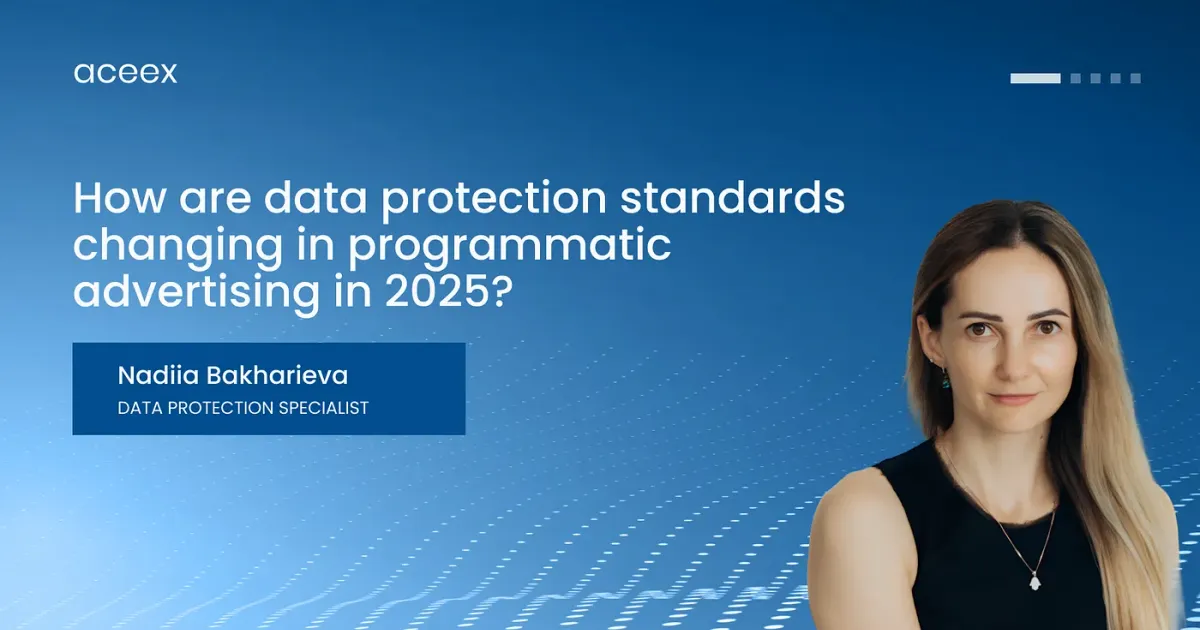The digital advertising landscape is undergoing a transformation. As regulatory bodies tighten their grip on data privacy, advertisers, publishers, and tech vendors must adapt to survive. Transparency, consent, and compliance are no longer optional — they are essential.
One of the key frameworks that define these new standards is the IAB Europe Transparency and Consent Framework, and obtaining TCF Vendor Status has become a benchmark for companies operating in the programmatic advertising ecosystem related to end users from the EU.
To shed light on this topic, we sat down with Nadiia Bakharieva, our Data Protection Specialist, to discuss the evolving standards of data protection in AdTech and what TCF Vendor Status means for companies like Aceex.
How are data protection standards changing in programmatic advertising in 2025?
Nadiia Bakharieva: The biggest shift is giving users more control. Regulations are strict, and companies need to demonstrate more transparency in how and why they use personal data. Users’ privacy-consciousness is advancing, and RTB participants wish to rely on partners compliant with the regulations. In 2025, we see a continuous move toward confirmation of technical compliance by reputable organisations as IAB.
One of the most noticeable trends is the shift from implied consent to granular, user-driven choices. It’s no longer enough to display a consent banner cause users must be able to manage what data they share and with whom. This means programmatic advertising must be more technically able to support applying end user’s permissions regarding their personal data.
Why are data transparency and security becoming key factors for publishers and advertisers?
Efficient advertising runs on trust. Users who feel that their data is handled responsibly are more likely to engage with content and ads. For publishers, this means better traffic quality. For advertisers, it ensures their budgets are spent efficiently and not lost to fraud.
When users trust that their data is protected, they don’t block ads or avoid websites. For publishers, that means more direct traffic and better monetization. Advertisers, in turn, gain access to premium audiences who are actively engaging with content rather than dodging intrusive tracking mechanisms.
In contrast, a lack of transparency can lead to ad fraud, wasted budgets, and even legal consequences. The advertising industry has learned the hard way that operating in the gray area of data usage is unsustainable. The introduction of stricter frameworks like TCF is an attempt to formalize what should have been the norm all along: data processing practices compatible with the standards of GDPR.
What is TCF Vendor Status, and what criteria must be met to obtain it?
TCF Vendor Status is a seal of compliance under IAB Europe’s Transparency and Consent Framework (TCF). It was created to ensure that all participants in the digital advertising supply chain adhere to GDPR and ePrivacy Directive regulations.
A Vendor ID under TCF is a unique identifier assigned to a vendor once they successfully register and are listed on the Global Vendor List (GVL) managed by IAB Europe.
To obtain a Vendor ID, a company must adhere to TCF Policies and comply with all required guidelines, implement transparent consent mechanisms across their services, and ensure that their data processing practices align with GDPR.
Companies can verify a vendor’s TCF status on the IAB Europe website, ensuring they work with partners that meet EU privacy standards.
What new opportunities does TCF Vendor Status open up for advertisers and Aceex partners?
Nadiia Bakharieva: The biggest advantage is access to the EU market. European regulations are among the strictest in the world, and advertisers looking to scale in the region need partners that are compliant.
For Aceex, obtaining TCF Vendor Status signals to partners that we are committed to high-quality, privacy-first advertising. It means our platform meets the required data protection standards, giving publishers a boost in traffic scope and all parties to the RTB process an assurance that privacy compliance is sustained.
How does this status affect monetization efficiency for publishers: General opinion
A compliant publisher attracts top-tier advertisers willing to pay more for high-quality placements. That means higher CPMs, more stable revenue, and fewer issues with ads being blocked due to policy violations.
If an SSP, DSP, or any other ad tech company has TCF Vendor Status, it unlocks access to premium demand sources. Many of the largest brands and agencies won’t work with companies that lack TCF compliance. This directly impacts revenue streams.
Additionally, publishers who work with TCF-compliant vendors experience fewer compliance-related ad blocks. Major demand partners, including Google and other ad exchanges, prioritize working with vendors who follow industry-recognised privacy standards. This gives additional opportunities for traffic exchange.
Final thoughts
As the advertising industry moves toward privacy-first solutions, compliance with frameworks like TCF is not just a regulatory requirement but a competitive advantage. Advertisers, publishers, and vendors that align with these standards will see stronger user trust, higher revenue, and better long-term sustainability.
For companies like Aceex, obtaining TCF Vendor Status isn’t just a milestone — it’s a statement that we apply our best efforts for personal data compliance in digital advertising.
